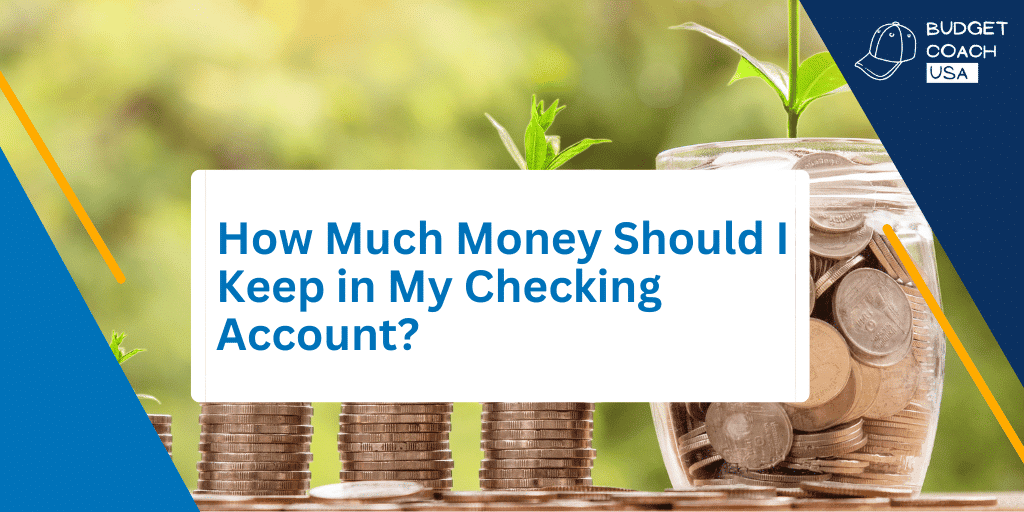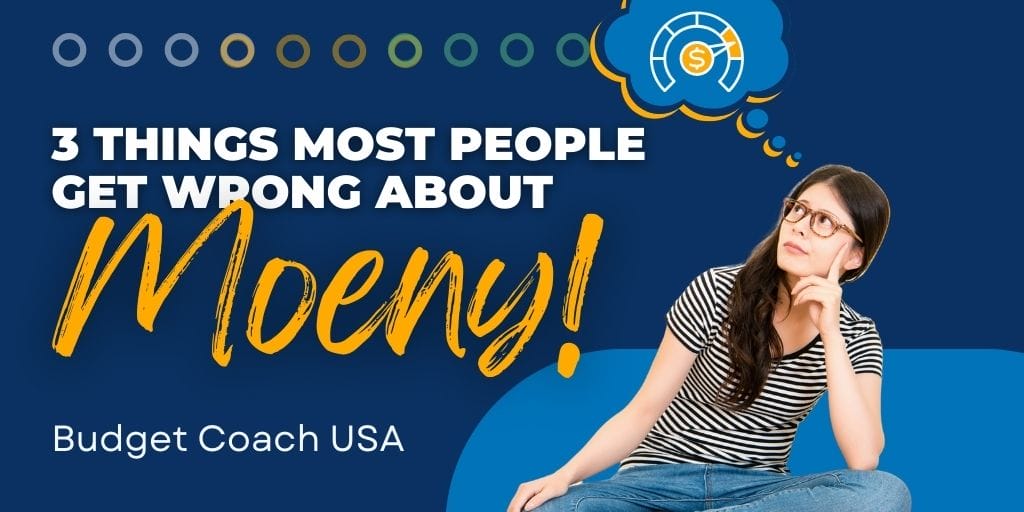I work hard, so why don’t I have more money?
I remember asking this same question so many times in the past. Why don’t I have more money? After all, I had a full-time career in which I was successful, a home and family, and a second income. Yet, at the end of the month, it felt like we were scraping the couch cushions for milk money. I often looked at the successful appearance of friends from college or work colleagues and came up with excuses. “They must have inherited money from family.” Or, “their college expenses were paid for by their parents so they had a better start in life.”
Over the years I learned that not having more money was less about luck or family circumstances and more about my choices. The reason I didn’t have more money was mostly about choices. Most millionaires in the US today have a propensity for saving, a natural aversion to debt, and most importantly, the ability to choose what they want most, over what they want now. And, they never ignore the numbers. They win with a lifetime of smart choices.
5 Possible Reasons Why You Don’t Have More Money.
1. Too Much Debt

Debt is Enriches the Lender, Not You.
Debt is a financial product that enriches the bank (lender), not you. Your bank is not like your local library. They won’t let you borrow for free and bring it back whenever you feel like it. Your bank exists to make money and their primary product is debt. Their goal is to sell you as much debt as they can, for as long as they can. And it all comes at your expense.
Banks loan you money and require you to pay back the loan with interest. Math says that when you are done paying back the loan, you have less money than when you started. Ignore math if you want, but you’ll spend your life playing catch-up if you swim with the sharks. You can’t build a stable financial future playing catch up. Borrowing money doesn’t help you have more money.
Debt is not an inevitable reality.
Life presents a lot of challenges. Some of us are born into families with means and others are born into more modest circumstances. There are people on all spectrums in between. But one thing we all share in common as we become adults is the ability to make our own choices to improve our future. For some, the journey to financial independence is a much steeper slope. But it is possible.
History is replete with examples of individuals who gained astonishing sums of money and squandered it all away. (Think lottery winners and some professional athletes for example) History is also full of examples of those who started with nothing and rose to great wealth. The issue with eliminating debt from your financial life has little to do with where we start. It has more to do with how we handle money when we get it. Personal finance is 20% math and 80% behavior.
If you want more money to accumulate in your life, avoid debt.
2. Not Budgeting Your Income

Budgeting Creates Better Spending Decisions
A zero-based budget puts all the cards on the table and reveals your hand. There is nowhere to hide. For instance, if you are following a zero-based budget faithfully you will soon see if you are overspending on groceries or another category. Once you have that knowledge you only have a couple of choices: Keep overspending or adjust your habits to meet your goals. A zero-based budget shines a light on your spending decisions and creates opportunities for you to make choices that align with your goals. Not using a budget leads to less money in your life. Guaranteed.
A Zero-Based Budget Relieves Most Anxiety Around Money
A zero-based budget removes the unknowns and replaces them with knowns. Most people experience anxiety around money because they don’t know where their money is going or if they’ll have enough when they need it. What if I told you that you could know with almost certainty that when your car breaks down, you’ll have enough money to pay for the repairs in cash? Or that if your home’s roof springs a leak, you can handle the new roof without using credit? A well-planned and executed zero-based budget allows you to know where your money is, where it is going, and how much you need to save.
A zero-based budget brings certainty out of the unknown. It brings clarity out of confusion. However, even the best-planned zero-based budget is no match for a spender who cannot control their impulses. Not using a budget leads to less money in your life.
3. Buying Stuff You Can’t Afford Instead of Saving & Investing

Living only for today won’t end well.
We all want to have fun and enjoy our lives but living entirely for now without planning for the long term won’t end well. If you don’t want to live in your kids’ basement one day, you’ll need to live for more than just now. Spending money wisely means thinking long-term.
- Make and use a zero-based budget that includes room for paying off your debt and saving for the future.
- Begin investing and saving for retirement today. It is never too late. The old Chinese proverb says “The best time to plant a tree was 20 years ago. The second best time is now.”
Consider future responsibilities.
Leave room for your future responsibilities in your spending decisions.
- Keep your eye on the future when budgeting and spending. What we want now and what we need long term are very different things. So submit your spending decisions to a budget that is pre-planned and considers both here and now as well as the future.
- Spending money wisely means using personal discipline to make smart choices. If you always feel broke, it is because you are not organizing your money in a way that acknowledges reality. Leaving your future responsibilities out of your spending is not a wise thing to do and will leave you broke when it is time to retire.
4. Ignoring the Numbers

Know Your Numbers
If you don’t know how much money is coming in each month (your income) and you don’t know exactly how much money is going out each month it is not surprising that you don’t have more money. To be able to save money, you must first know your numbers. The best way to begin saving money is to start by creating a monthly zero-based budget.
A zero-based budget forces accountability over how you choose to spend every single dollar. You may have tried in the past to “budget” by writing down how much you plan to spend in certain categories for a month, however, if the budget you are creating is only a loose collection of how much you plan to spend it misses a key element: You haven’t weighted it against your income and assigned every dollar of income a job. The dollars of income that are not assigned to a job are likely to walk away, or at minimum, they’ll be directed toward the wrong target. When you have assigned a job to every dollar of income, you have forced yourself to put those dollars where you have pre-determined they should go.
Control Your Appetite
Spending is an appetite! Appetites left unchecked will only grow. The key to saving money is to control your appetite. Nothing will eat up your monthly margin like ignoring your numbers and spending with your emotions. A good reason you can’t save money is because you can’t control your appetite/ spending.
Telling yourself “no” cannot be avoided. So get used to it. If you want to reach your goals, quit living paycheck to paycheck, and save money you’ll have to learn to make yourself and your money behave. This means telling yourself “no” will be required. Budgets by definition are limiting. They have boundaries. And if you are going to live within limits and boundaries, you’ll have to understand that “no” is part of the process. Having more money requires saying no to unplanned purchases.
5. House Poor

Use the 25% Rule
There is nothing wrong with wanting a nice, large home to live in if that is your desire. But when you have more house than you can afford we call it “house poor”. House poor means that too much of your monthly take-home pay is going toward your mortgage or rent. There are few things in your monthly budget that can cause you to feel broke more than being house-poor. If your mortgage or rent is more than 25% of your take-home pay you will begin to feel it. When that percentage rises to 35% even the best budgeting wizards will feel the squeeze on an everyday basis. When your mortgage or rent rises above 40-45% of your take-home pay it can cause severe financial distress for almost anybody.
Just for Now, Not Forever!
Trying to keep up with your friends and neighbors’ lifestyles is a recipe for financial distress. Keep a couple of things in mind when trying to keep up with your friends and family when it comes to your living and lifestyle choices.
First, they may just have more income making their lifestyle sensible for them. Some people earn more. Congratulations to them. But trying to keep up with them on your income is a bad idea. Second, they may look good on the exterior, but on the inside, they are more broke than you are. Don’t judge the book by its cover.
If you will keep your mortgage/ rent payment no higher than 25% of your take-home pay, you’ll set the table with plenty of opportunities to save and prepare for an upgrade when the time is right. What feels like a sacrifice now will be a blessing down the road. It is just for now, not forever.
Why Don’t I Have More Money?
Succeeding with money requires a planned approach. If you have not been using a monthly budget to plan your spending you are missing an opportunity to get the life you want. Budgets help “know” rather than “wonder”. Budgets answer questions. They provide guidance and direction. Using a budget is a road map for winning.
Having more money is less about luck or family circumstances and more about choices…your choices. Make consistently good choices and you’ll soon find more money in your bank account and less stress in your home.







